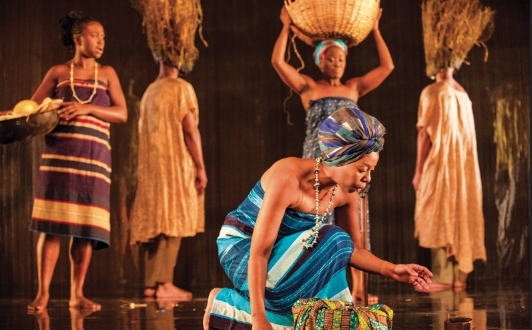
support@yorubalibrary.com
+2348073529208, 07038599574

The Yoruba people, primarily located in southwestern Nigeria, have a rich culture that has significantly influenced African and global communities. This article features various facets of Yoruba culture, providing an in-depth understanding of their traditions, values, and societal norms.
The Yoruba people, predominantly found in southwestern Nigeria, are one of the largest ethnic groups in Africa, with a population exceeding 40 million. The Yoruba cultural heritage is woven with elements of history, language, religion, art, music, and social structures that provide a fascinating insight into their way of life. Yoruba culture is not just about the past; it is a living, dynamic entity that continues to evolve while retaining its core values and traditions. From the sacred rituals of Ifá worship to the energetic rhythms of traditional music, from the colorful festivals that draw thousands of participants to the intricate beadwork and sculptures that have gained international acclaim, Yoruba culture is a testament to the creativity and resilience of its people.
Yoruba culture is not just about the past; it is a living, dynamic entity that continues to evolve while retaining its core values and traditions. From the sacred rituals of Ifá worship to the energetic rhythms of traditional music, from the colorful festivals that draw thousands of participants to the intricate beadwork and sculptures that have gained international acclaim, Yoruba culture is a testament to the creativity and resilience of its people.
1. Overview of Yoruba Culture
The Yoruba culture is renowned for its diversity and profound influence on the African continent and the diaspora. With a population of over 40 million people, the Yoruba have a distinct way of life that encompasses their language, beliefs, customs, and arts.
2. Historical Background
The Yoruba people have a long and storied history, dating back to ancient times. They are believed to have originated from Ile-Ife, considered the cradle of Yoruba civilization. This historical city is said to be the birthplace of humanity according to Yoruba mythology.
3. Language and Communication
Yoruba, a tonal language, is spoken by millions of people. It has various dialects, but the standard Yoruba is widely understood. The language is rich in proverbs and idiomatic expressions, reflecting the wisdom and values of the Yoruba people.
4. Traditional Beliefs and Religion
The Yoruba religion, known as Ifá or Orisha worship, is an integral part of their culture. It involves the veneration of numerous deities, each with specific functions and attributes. The Yoruba believe in a supreme deity, Olodumare, and the significance of ancestors in daily life.
5. Yoruba Festivals and Celebrations
Yoruba festivals are vibrant and colorful, often involving music, dance, and elaborate costumes. Major festivals include the Olojo Festival in Ile-Ife, celebrating the creation of the world, and the Eyo Festival in Lagos, known for its iconic white-clad masqueraders and many more.
6. Art, Music, and Dance
The Yoruba are famous for their artistic expressions, including sculpture, beadwork, and textiles. Yoruba music, featuring traditional instruments like the talking drum, and dances are integral parts of ceremonies and celebrations, conveying stories and emotions.
7. Social Structure and Family Life
Yoruba society is organized into extended families, with a strong emphasis on kinship and community. Elders are highly respected, and family life revolves around mutual support and cooperation. The Yoruba naming ceremony, "Isomoloruko," is a significant rite of passage.
8. Yoruba Cuisine
Yoruba cuisine is rich and diverse, with staples such as yam, plantain, and rice. Popular dishes include pounded yam (Iyan) with egusi soup, gbegiri and amala, eegbo, ewa agoyin, aadun, and moin-moin. Meals are often communal, reflecting the importance of family and community.
9. Clothing and Adornments
Traditional Yoruba attire is colorful and elaborate. Men typically wear "agbada" and "buba/sooro," while women wear "iro" and "buba," often complemented by a head wrap called "gele." Beaded jewelry and intricate hairstyles are also significant aspects of Yoruba fashion.
10. Yoruba Proverbs and Morals
Yoruba proverbs, known as "Owe," are rich in meaning and wisdom, often used to impart moral lessons and values. They reflect the importance of integrity, respect, and communal harmony in Yoruba society.
Conclusion
The Yoruba culture has traditions, beliefs, and practices that have stood the test of time. From their intricate art forms to their profound religious beliefs, the Yoruba people continue to preserve and celebrate their heritage, contributing to the global cultural mosaic.
By understanding and appreciating Yoruba culture, we can gain deeper insights into their way of life and the values that bind this prestigious tribe.

Learn about the Yoruba concept of Ìwà Pẹ̀lẹ́ (good…

Learn special praises for Divine Being and Creator…